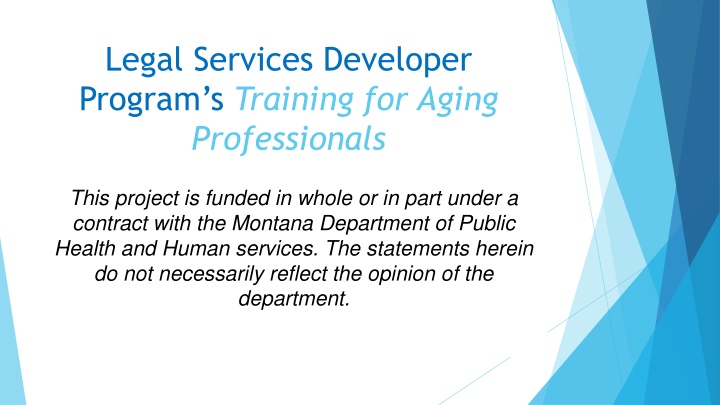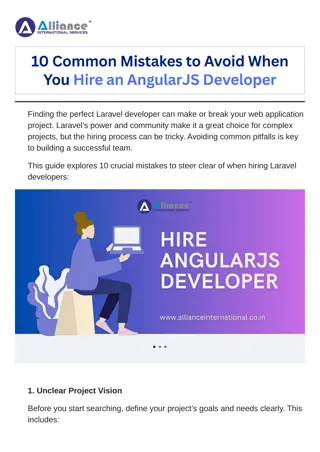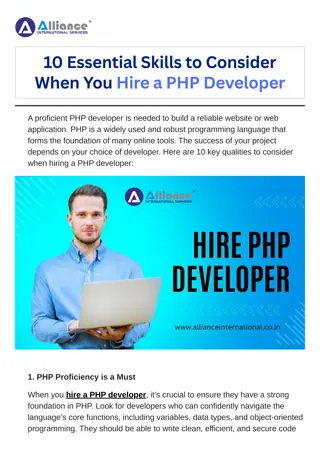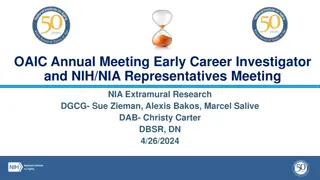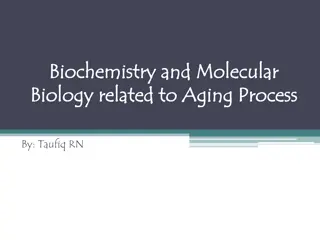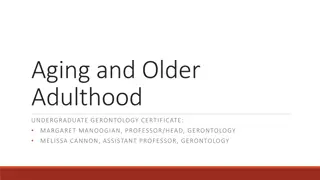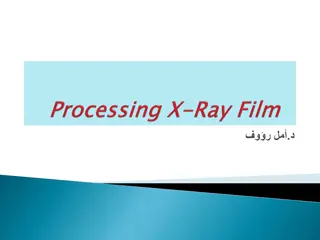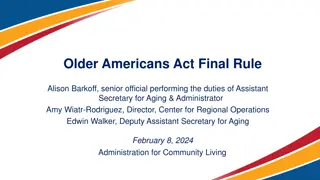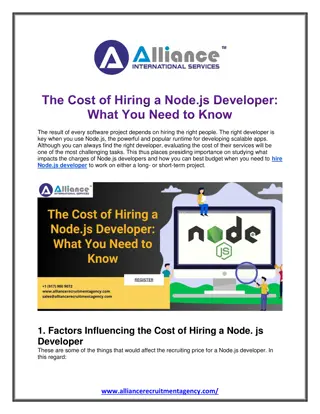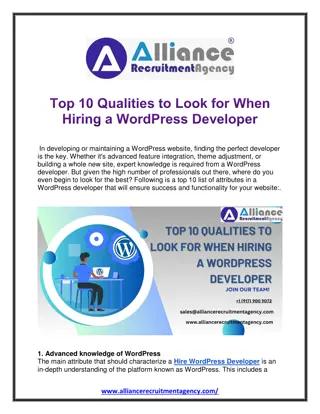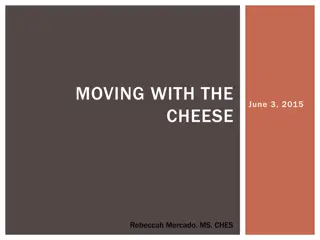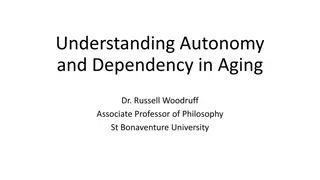Legal Services Developer Program's Training for Aging Professionals
This project, funded by the Montana Department of Public Health and Human Services and supported by the Senior Financial Defense Grant, focuses on training for aging professionals to address family dynamics, estate planning, and financial safeguards for seniors. The team includes dedicated individuals who have personal experiences with aging issues and emphasize the importance of proactive planning for the future.
Download Presentation

Please find below an Image/Link to download the presentation.
The content on the website is provided AS IS for your information and personal use only. It may not be sold, licensed, or shared on other websites without obtaining consent from the author.If you encounter any issues during the download, it is possible that the publisher has removed the file from their server.
You are allowed to download the files provided on this website for personal or commercial use, subject to the condition that they are used lawfully. All files are the property of their respective owners.
The content on the website is provided AS IS for your information and personal use only. It may not be sold, licensed, or shared on other websites without obtaining consent from the author.
E N D
Presentation Transcript
Legal Services Developer Program s Training for Aging Professionals This project is funded in whole or in part under a contract with the Montana Department of Public Health and Human services. The statements herein do not necessarily reflect the opinion of the department.
Presented by the Senior Financial Defense Grant This project was supported by Grant No. V66-92522 awarded by the Montana Board of Crime Control (MBCC) through the Office of Justice Programs, US Department of Justice. Points of view in this document are those of the author and do not necessarily represent the official position or policies of the US Department of Justice.
Aging and Family Dynamics Presented by Katy Lovell, Richard Heitstuman, Katherine Feehan
Who We Are Legal Services Director, Katy Lovell: I see family conflict on a daily basis through our work. I ve dealt with aging grandparents, and am currently helping to care for my mother-in-law, who has multiple health issues. I m part of the sandwich generation. Project Coordinator, Richard Heitstuman: In my role with the Senior Financial Defense Grant, I get the opportunity to help seniors prepare financially for the future, putting in place the safeguards that will protect them from financial exploitation in the future. I have also seen my grandparents progress through their later years and have seen how my family reacted to my Grandpa s Alzheimer s Disease. My perspective on aging is prevent, don t react. Prepare for the future now and enjoy your golden years! AmeriCorps member, Katherine Feehan: In my work here I m often the first outsider many talk to about their family issues, if they haven t started planning yet. The different sides of my family took very different approaches to aging, I ve seen a bit about the stress those different choices make.
Our Families Katy: In doing my estate planning, I discovered how different my wishes are from those of my spouse. Conversations ahead of time will hopefully decrease issues later. Richard: We take the approach of prepare young, relax later. My family has prioritized estate planning early and we have had the discussions that need to be had now, before the situation changes. Not only do our parents have their estate planning documents done, most of us kids have them done too, as do our spouses. We know who will fill what role, from financial to healthcare to daily assistance. By preparing now, we hope to make our parents and our own aging processes that much smoother. Katherine: Both of my grandmothers had Alzheimer s and lived a distance away from my family. They prepared a lot, but it wasn t always enough.
All adults, but especially seniors, need to have a plan for their estate and financial future. Estate planning will legally define a plan for your future, as you age, even in the event of the unforeseen, like disease or injury. Talk to your family! It is never too early to discuss with your family their future roles, depending on the level of assistance you may require in the future. Nobody likes to think about needing help but planning for it and talking about it now will ensure that help is available in the future. The Senior s Role Think about your family members strengths. Do you have a family member that is great with finances? How about someone who is caring and attentive? By identifying family member s strengths and weaknesses, it will be easier to delegate portions of your potential future care.
An Estimated 41.8 Million Americans are providing care for someone over the age of 50 6/10 help with ADLS on a daily basis believe their own health has worsened while providing care Caregiving: By the Numbers 1/5 report financial strain because of caregiving 61% of caregivers are women with an average age of 49.4 years 24% care for more than one individual 53% of caregivers felt that they had no choice but to provide care
The Conversation Project Initiative of the Institute for Healthcare Improvement Started in 2010 Goal is to encourage conversation at the kitchen table instead of the ICU All materials are free to download and print https://theconversatio nproject.org/
Disagreement among adult children about care Disagreement among adult children about finances Difficult Family Situations Family Farms Inheritance Issues Blended Families Driving
Talking to Aging Parents about Driving 712 seniors are injured and 19 are killed every day in car accidents Bringing up the discussion Plan ahead Don t start off too strong Handle objections with reflective listening Allow for a long conversation Check out other causes for impaired driving Multiple causes related to aging Medical Conditions Vision Impairments Hearing Impairments Drug interactions/side effects
Abusers use a pattern of coercive tactics, such as isolation, threats, intimidation, manipulation, and violence, to gain and maintain power over victims. Categories of Elder Abuse and Late Life Domestic Violence Physical: Intentional use of physical force to cause harm. Sexual: Forced sexual interaction, including penetration, unwanted contact, or non-contact acts such as harassment. Emotional or Psychological: Verbal or nonverbal behaviors causing mental pain, fear, or distress. Neglect/Abandonment: Failure to meet basic needs such as food, water, shelter, clothing, hygiene, and medical care, including leaving a dependent adult alone without planning for their care. Financial: Illegally or improperly using an elder s money, benefits, belongings, property, or assets for someone s benefit other than the older adult. Resources: Domestic Violence and Seniors Montana Coalition Against Domestic and Sexual Violence 406-443- 7794
Financial Exploitation by Family/Caregiver 1 in 10 Seniors experience some form abuse, but only 1 in 24 cases are ever reported 60% of abuse and neglect is perpetrated by a family member 53-64% of victims cohabitated with the perpetrator at the time of the offense 1 out of 2 adults with dementia experiences abuse
Tools for Dealing with Conflict
Important Tool for preventing conflict Especially important documents: Powers of Attorney for Health Care and Finance https://dphhs.mt.gov/Portals/85/sltc/documents /legaldeveloper/2021ClinicandTrainingSchedule.p df?ver=2021-03-10-095153-170 (Clinic Schedule) Estate Planning https://dphhs.mt.gov/sltc/aging/legalservicesde veloper/forms Make sure you see and READ any documents family members allege exist
Holding a Family Meeting Set an agenda for the meeting Focus on the now try not to bring up past or unrelated issues Share feelings instead of accusations Listen and respect opinion of all participants Everyone gets time to speak Share all information If possible, have medical assessments done ahead of time and distribute to all Use email, online sharing tools, conference calls, in-person meetings to keep everyone updated
A contract typically a family member or caregiver who agrees to provide caregiver services for a disabled or aging relative and the person receiving care. Clarifies for a family what tasks are expected in return for a stated compensation Personal Care Agreements The agreement must be in writing. The payment must be for care provided in the future (not for services already performed). Compensation for care must be reasonable.
Personal Care Agreements Cont. A properly drafted personal care agreement will contain: Date the care begins Detailed description of services to be provided, (ex: transportation and errands: driving to medical, dental, adult day care, and other appointments, food preparation) How often services will be provided (Allow for flexibility in care needs by using language such as, no less than 20 hours a week or up to 80 hours a month. ) How much and when the caregiver will be compensated (weekly or biweekly) How long the agreement is to be in effect (The agreement should set time, such as a year or two years, or even over a person s lifetime.) A statement that the terms of the agreement can be modified only by mutual agreement of the parties in writing The location where services are to be provided (home of elder/adult with disabilities, caregiver s own home, other location. Allow for the location of the care to change in response to increasing care receiver needs.) Signatures by the parties, date of the agreement
Mediation A procedure in which the parties discuss their disputes Assisted by a trained impartial third person(s) who assists them in reaching a settlement May be an informal meeting among the parties or a scheduled settlement conference. The dispute may either be pending in a court or potentially a dispute which may be filed in court. Resources in Montana: Montana State Bar: https://www.montanabar.org/page/DisputeResolution Montana Law Help: https://www.montanalawhelp.org/resource/what-is-mediation
AARP Free Resource Line: 1-877-333-5885 for caregivers Tax Tips for Family Caregivers Medicial Marijuana guidance What to Know When Taking Someone to the Doctor https://www.aarp.org/caregiving/
24/7 Helpline: 1-800-272-3900 Know the 10 Signs Caregiving by Stages Alzheimer s Association Local Support https://www.alz.org/help- support/caregiving https://www.alzheimersnavigator.org/ dashboard.aspx https://www.alz.org/montana?set=1
